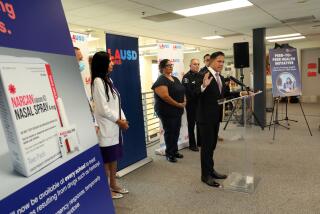Education the Cure, Not the Disease : Youth: The Norplant program at San Fernando High is a valuable service in preventing unwanted pregnancy.
- Share via
The new Administration has proposed improved access to health care, including reproductive health care for all Americans.
At San Fernando High School, young people have enjoyed improved access to health services for more than five years.
The clinic there provides essential health services to teen-agers who would otherwise lack them.
These kids can get mental-health services, birth-control information and AIDS-prevention information right on campus.
There has been community opposition to the reproductive health care provided by the clinic, and especially to the fact that the birth-control system Norplant is offered as an option to young women there. I believe that the opponents are mistaken.
It is young women who suffer the consequences of unwanted pregnancies. I support their right to have ready access to birth control. This includes Norplant, which works for five years and has side effects comparable to other methods. If after careful explanations a young woman decides that Norplant is right for her, she can make an informed choice.
AIDS education, of which I am both an advocate and practitioner, is a distinctly separate issue.
Some critics of Norplant and other non-barrier methods of birth control correctly point out that they do not prevent HIV and other sexually transmitted diseases, or STDs. At this time it is simply unrealistic to expect any method of birth control including condoms to be both maximally protective against unwanted pregnancy and STDs.
Education to avoid HIV and other STDs, including but not limited to using condoms, should be provided in the same clinics where birth control is offered. That is the case at the San Fernando student health clinic.
We AIDS educators have tried for years to assist young women in being more assertive with their partners on the issue of condom use to prevent sexually transmitted diseases. We have learned that there are formidable obstacles.
Some are cultural and ethnic. Some are simply a matter of gender. Women risk infertility from multiple diseases and sometimes require surgery. Men are less traumatized by these diseases and are apt to be less sensitive about them. Young men need information on reducing the risk of STDs as much as young women. They need to learn about the harm they can do to women.
And both men and women, boys and girls need the information early. Every survey shows that a high percentage of kids these days are already sexually active. When I do AIDS education for seventh- to ninth-graders, I am struck by their knowledge and the sophistication of their questions. Yet when I leave the schools, I have doubts that they know as much as they need to know to protect themselves.
San Fernando High’s clinic program is controversial, especially for offering Norplant. It could fall by the wayside as a result of community backlash or budget cuts.
That would be terribly unfortunate. Teen-agers have an urgent need for services in the areas of mental health, reproductive health and prevention of sexually transmitted diseases.
And look at the risks of not providing teaching and reproductive care: unwanted pregnancy, abortions, HIV and other sexually transmitted diseases that can leave lasting scars. These risks are very real. As a doctor, I still see young people with newly diagnosed HIV, despite the fact that we have known for years how to prevent it. It is a tragedy to see young people living with doubts about their future because of diseases they could have avoided.
More to Read
Sign up for Essential California
The most important California stories and recommendations in your inbox every morning.
You may occasionally receive promotional content from the Los Angeles Times.













